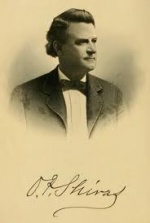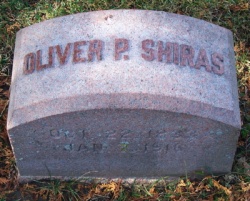Encyclopedia Dubuque
"Encyclopedia Dubuque is the online authority for all things Dubuque, written by the people who know the city best.”
Marshall Cohen—researcher and producer, CNN
Affiliated with the Local History Network of the State Historical Society of Iowa, and the Iowa Museum Association.
SHIRAS, Oliver Perry: Difference between revisions
No edit summary |
No edit summary |
||
| Line 33: | Line 33: | ||
It should also be noted U.S. Supreme Court Justice George Shiras, Jr. married Dubuque born Lillie E. Kennedy (b. 1842) daughter of Robert T. Kennedy (b. 1819). It appears Robert T. Kennedy and several of his children are buried in Dubuque. | It should also be noted U.S. Supreme Court Justice George Shiras, Jr. married Dubuque born Lillie E. Kennedy (b. 1842) daughter of Robert T. Kennedy (b. 1819). It appears Robert T. Kennedy and several of his children are buried in Dubuque. | ||
--- | --- | ||
Revision as of 02:28, 23 January 2020
SHIRAS, Oliver Perry (Pittsburg, PA, Oct. 22, 1833--Seabreeze, FL, Jan. 7, 1916). Largely through the efforts of Judge Shiras, citizens of Dubuque today enjoy EAGLE POINT PARK. When it became obvious that tennis was becoming an extremely popular sport in the community he later contributed one of the city first public TENNIS COURTS to the park. Shiras also helped organize the YOUNG MEN'S LITERARY ASSOCIATION and served ten years as its president, served as a trustee of FINLEY HOSPITAL (THE) and vice-president of the Public Library Board.
Shiras came to Dubuque soon after his graduation from Yale in 1856. (1) During the CIVIL WAR he served as aide-de-camp to General Francis J. HERRON in campaigns through Arkansas, Mississippi, Missouri, and Louisiana.
After the war, Shiras returned to politics and his legal practice in Dubuque. He served on the City Council in 1866 and 1867, filling out an unexpired term of an elected official who moved from the ward from which he was elected.
He was offered several foreign appointments by Senator William Boyd ALLISON, but refused them to work in the firm of Shiras, Van Duzee, and Henderson in Dubuque (2) Shiras served as a Republican delegate to many state and congressional conventions. On August 2, 1882, during President Arthur's administration, he was appointed United States Judge of the Northern District of Iowa and held the position until his retirement in 1903.
Among the many important legal decisions in his career was the one he returned in the case of Washburn & Moen Company vs the Beat-Em-All Barbed Wire Company of Cedar Falls, Iowa. After hearing over three hundred witnesses, Shiras returned a verdict in favor of the defendants that resulted in prairie farmers no longer being victimized by high-priced fencing. In the case of Trans-Mississippi Freight Association, Shiras held that the Sherman Anti-Trust Act did apply to railroads and his decision was upheld by the supreme court. He was involved in many cases involving Native Americans. (3) Shiras was involved in so many equity cases that a famous law book Shiras' Equity Practice was written. He was considered one of the best authorities on bankruptcy in the nation and his law library in Dubuque was often the source of references that could not be acquired by beginning lawyers. (4)
During Shiras' twenty-two-year judicial career he served as a judge of the Northern District, held circuit court in states that were part of the Eighth National Judicial Circuit, and was a member of the Circuit Court of Appeals for five years. When he retired in 1904, Shiras received a personal letter of congratulations and good wishes from President Theodore Roosevelt. (5)
Oliver Perry Shiras, George SHIRAS, Jr., and Francis J. Herron were second cousins. Oliver & George Shiras's mother Eliza and Francis J. Herron where first cousins.
The Shiras and Herron brothers all came to Dubuque around 1855 from the Pittsburgh area. George Shiras II (b.1806) married Elizabeth Perry Herron and had George Jr. (III) (b. 1832), Oliver Perry (b. 1833) and Francis Herron Shiras. Eliza Herron's (b.1809) father was Francis J. Herron's (b. 1837) uncle Rev. Francis Herron (b. 1774). Francis J. Herron's father was Francis Herron's brother and Francis J. Herron's uncle John Herron Jr. (b. 1792). Elizabeth Herron Shiras and Francis J. Herron's grandfather was also named John Herron Sr.
Francis J. Herron also had a brother, David R. Herron, Lieutenant in the 3rd Iowa Light Artillery Battery, also known as the Dubuque Battery, organized in Dubuque. And besides Oliver P. Shiras serving as aid de camp to Br. Gen. Francis J. Herron during the Civil War, Herron had a nephew, James A. Herron, son of brother William A. Herron (b. 1821), who served on his staff.
It should also be noted U.S. Supreme Court Justice George Shiras, Jr. married Dubuque born Lillie E. Kennedy (b. 1842) daughter of Robert T. Kennedy (b. 1819). It appears Robert T. Kennedy and several of his children are buried in Dubuque.
---
Source:
1. "Renowned Jurist Chose Dubuque as Home by Accident," Telegraph-Herald and Times-Journal, August 24, 1930, p. 18
2. "O. P. Shiras Retires as a Jurist After 20 Years, Dubuque Telegraph-Herald, November 1, 1903, p. 4
3. Ibid.
4. Ibid.
5. "Renowned Jurist..."
http://archiver.rootsweb.ancestry.com/th/read/HERRON/2005-12/1135815989
http://www.findagrave.com/cgi-bin/fg.cgi?page=gr&GRid=42719104
http://www.historycentral.com/Bio/rec/GeorgeShiras.html
http://www.findagrave.com/cgi-bin/fg.cgi?page=gr&GRid=42678583
http://www.findagrave.com/cgi-bin/fg.cgi?page=gr&GRid=33811968
Genealogy research by John Pregler





